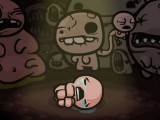Alert, alert! @EdmundMcMillenn has recently opened up a new Tumblr dev blog for The Binding of Isaac: Rebirth.
That ends the newsworthy portion of this post; certainly, the opening of the Tumblr is major news to any and all Isaac buffs (like myself! I am your Golden God!), as McMillen has promised a weekly stream of teasers from the forthcoming Nicalis remake: videos, gifs, screenshots, information, and music. Diptera Sonata, below, won me over very quickly:
The main thing that I’d like to draw attention to, however, is McMillen’s personal Tumblr, which is now largely a domain for nigh-daily Q&A for fans. McMillen’s answers are astonishingly open, honest, and gripping, and recommended reading for anyone interested in the making of art and video games.
I’ll let one of the entries do the talking:
i do enjoy answering questions that might help people, i know i could have used some advice when i was younger so i usually answer those. i think its important when being in the public eye to put as much as you can out there so people get a better idea of you as a whole person, instead of the caricature the press/internets paint you out to be 1)http://edmundm.com/post/70353083303/do-you-enjoy-having-your-fans-a-lot-of-people-look-up
Here are some more past examples of the kind of answers that you can expect from McMillen. (more…)
References
